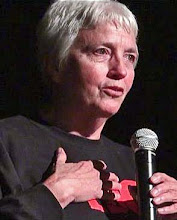 Standing on the edge of the sea of homeless men and women at the Phoenix Human Service Campus, this woman looks afraid to plunge in. Phoenix tries to provide services, and agencies work hard to meet the need, but with over 1,000 men and women showing up daily, and resources being limited, way too many folks fall through the cracks, er, abyss.
Standing on the edge of the sea of homeless men and women at the Phoenix Human Service Campus, this woman looks afraid to plunge in. Phoenix tries to provide services, and agencies work hard to meet the need, but with over 1,000 men and women showing up daily, and resources being limited, way too many folks fall through the cracks, er, abyss.I asked their first name, and then inquired as to a brief description of their experience with homelessness. I offered a few examples: volunteer at a shelter, know someone who is homeless, or see homeless people on the street. They weren't limited to that, but it was a good starter.
Of the 19 students, 3 volunteered at shelters, 3 knew someone who was homeless, and 13 just based their knowledge, and less-than-sympathetic attitudes, on the multitude of homeless men and women they see on the streets of El Paso. That blew me away!
Only two people--someone whose childhood friend was homeless and someone with a friend who experienced domestic violence--acknowledged that families and teens are homeless too.
This group was at least open-minded and after they watched My Own Four Walls, they demonstrated a much more realistic knowledge and understanding of the scope of homelessness. The MOFW kids talking about their experiences of homelessness make a powerful tool to open peoples' eyes. I have great hopes that this class of (mostly) young people will go forth and share compassion along with education.
Would that the feds' homelessness czar, Phil Mangano, and his unenlightened policymakers have the same conversion experience! Each time I pass homeless men and women on street corners or in other outdoor locations I fume. In no way do I believe the administration's claims that things are getting better for those "chronically" homeless. Sure, a few folks here and there might be better off, but at what cost?
Seems to me that homeless adults are emblemic of our society's throw-away mentality. Not working? Throw it out! But the "its" are people. P E O P L E. They are brothers, sisters, sons and daughters, aunts and uncles and cousins....Sure, some have problems, but who doesn't? Throwing them in jail; or, as some communities do, coralling them in to a specific area with the unrealistic expectations that they'll all stay put like lemmings; or chasing them away (read a spicy blog about Seattle's approach) by making life miserable enough to make leaving look inviting, all those methods are being employed in the "10 Year Plan to End Homelessness" scatter them approach.
Who to believe--the Ivory Tower Czar of Homelessness, Phil Mangano--or the cruising RV queen of homelessness, Diane Nilan? Depends on whether you want to sweep the dirt under the rug and go out and play or face the fact that what we've been doing with homelessness isn't working too well.
And, as a painful reminder... the long-time homeless adults on our urban landscapes will quckly be replaced by homeless kids we're currently ignoring by our "chronic homelessness initiative." Smart.
















